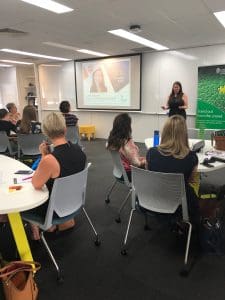Capacity-Building Approaches for Dialogue and Conflict Resolution. Member Spotlight: Claire Holland.
Claire Holland is one of those personalities in the field of mediation with whom it would be possible to speak to for hours, so rich is her portfolio and so wide is her expertise in multiple areas of mediation and conflict resolution. In one word, Claire would define herself as a “pracademic”, (practitioner – academic) meaning that she teaches as a university lecturer at James Cook University in Conflict Resolution Processes and Facilitative Mediation Practice what she has practiced in the field for the last decade as an interfaith, legal, and community mediator. Claire strongly believes in the multiplier effect of teaching and coaching and especially in the power of practice-informed teaching. Moreover, she is a certified trainer offering professional development and coaching to industries and businesses. She also puts into practice her expertise as a practicing conflict coach with Conflict Coaching International. Furthermore, she is hosting a webinar on “Co-creating Mediation Models: Adapting Mediation Practices When Working Across Cultures” on December 5th, 2019, at 5:00pmET. Register for it here!
Merging Mediation & Peace Studies into Practical Experiences
 As a mediator and peacebuilder, Claire is particularly passionate about the role that dialogue and communication play in creating more peaceful societies: “I chose a career in mediation because I believe that the fundamental principles of pre-dialogue preparation and effective communication are the cornerstones to understanding other people and supporting them to make conscious choices aimed at establishing good relations with others.” As an MBBI member, Claire is leading the ambitious project for the creation of an Oceania Chapter for MBBI, aimed at fostering capacity-building for conflict resolution and peacebuilding in the Asia-Pacific region.
As a mediator and peacebuilder, Claire is particularly passionate about the role that dialogue and communication play in creating more peaceful societies: “I chose a career in mediation because I believe that the fundamental principles of pre-dialogue preparation and effective communication are the cornerstones to understanding other people and supporting them to make conscious choices aimed at establishing good relations with others.” As an MBBI member, Claire is leading the ambitious project for the creation of an Oceania Chapter for MBBI, aimed at fostering capacity-building for conflict resolution and peacebuilding in the Asia-Pacific region.
Claire started as an undergraduate in Law & Economics and by chance took a course in Dispute Resolution. In that moment, she remained struck by how much her personal values aligned to this course and it flamed her interest in mediation. With a keen interest in peace studies and conflict analysis, she fully embraced this field to earn a Master degree in Mediation and Conflict Resolution at the University of Queensland while working at the Australian Centre for Peace and Conflict Studies.
Following a passion for mediation and international development, she gained invaluable experience working as a Mediation Specialist with the International Rescue Committee in Thailand, training local staff and community leaders inside refugee camps on the Thailand-Burma border, and secondly as Capacity Development Officer in the Philippines as an Australian Youth Ambassador with a local NGO.
A Capacity-Building Approach
These experiences left a mark on Claire, whose focus in current efforts strongly outlines the importance of conflict resolution at the local level. She firmly believes in a capacity-building approach at the grassroots level, and strengthening individuals to be able to identify conflict management and resolution options in communities and equip them with the skills and understanding to solve future disputes. “A capacity-building approach is key to creating confidence in local actors and empowering them towards the resolution or management of further conflict.” Her commitment with MBBI is a reflection of this: “One of the reasons I joined MBBI is its strong focus on capacity-building in the Asia-Pacific region!”
Even as a professional mediator, Claire’s involvement covers various areas. Firstly, she works with legal courts for cases of mandatory mediation. Secondly, she practices community mediation, dealing with neighborhood or relationship disputes in her own community, Townsville, Australia. Furthermore, she is a facilitator of interfaith dialogues, which she has been running within the university campus for 4 years: “I am attracted by how interfaith dialogue can support people’s understanding of their own religion. As well, people without a strong spirituality can better understand how religious people think, especially because in Australia most of the clashes are between religious and non-religious people.” Finally, Claire is involved in fostering practices of innovative justice in Australia and abroad.
Co-Creating a New Paradigm for Mediation
 Despite the multiple qualifications and job positions, Claire’s hunger for knowledge and constant innovation knows no bounds. She is currently involved in many research projects concerning inter alia positive leadership, interfaith dialogue, innovative mediation models, and her current doctoral studies in ‘wellness in the law’. She demonstrates a strong interest for the ‘co-creation’ of alternative conflict resolution models, by extrapolating best practices from Western schemes and using them jointly with models originating in non-Western contexts.
Despite the multiple qualifications and job positions, Claire’s hunger for knowledge and constant innovation knows no bounds. She is currently involved in many research projects concerning inter alia positive leadership, interfaith dialogue, innovative mediation models, and her current doctoral studies in ‘wellness in the law’. She demonstrates a strong interest for the ‘co-creation’ of alternative conflict resolution models, by extrapolating best practices from Western schemes and using them jointly with models originating in non-Western contexts.
Indeed, she is very careful to underline that Western models of mediation, based on a strong individualistic nature, are not always effective when applied to different cultural settings, instead they could turn out to be detrimental to the mediation process: “In some contexts in Thailand, for example, confidentiality may not be a key necessity, while for Western models of conflict resolution this is often requested.
Regardless of the mediation model in use, enhancing the dialogue among the parties is key in Claire’s opinion: “The fundamental premise for all alternative dispute resolution processes is finding ways to assist people to communicate more effectively.” What is, therefore, the secret for an effective mediator? A good level of self-awareness, highly enhanced communication skills, an openness towards questioning themselves continuously and, most importantly, a genuine interest for other people. “You must allow the parties to feel heard, to give them a voice. Deep listening is the key to effective mediation.”
An Oceania Chapter to Outline MBBI Outreach
Claire is quite a new member of MBBI, which she joined less than one year ago becoming involved with the MBBI Australian working group. She was attracted by the extraordinary networking opportunities offered by MBBI and by the fact that MBBI puts so much attention on building a high-quality profile for mediation and conflict resolution. “Conflict resolution is a fundamental skills and the real basis for peaceful societies,” she acknowledges, recognizing the criticality of building peace infrastructures able to sustain and maintain societies in a state of peace regardless of whether conflict does or does not occur. “Conflict is inevitable. It is neither positive nor negative per se, but it is the way you approach and deal with it can make it either a positive or negative experience.”
Despite her recent membership, Claire is leading, together with Chris LaHatte, Ken Waldron and members of the MBBI Australian working group, the creation of an MBBI Oceania Chapter, which will cover the Oceania and Asia-Pacific regions. The ambitious project of giving a more cohesive structure to MBBI regionally aims at fostering regional capacity-building to anticipate and deal with various kinds of conflict peacefully. The Chapter promises to be a living demonstration of MBBI’s global impact and outreach.
Written by Matteo Piovacari: MBBI Writer
